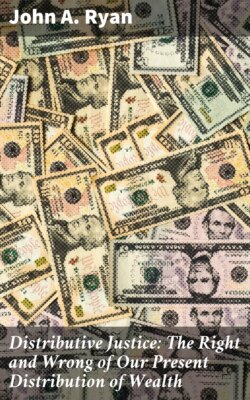Читать книгу Distributive Justice: The Right and Wrong of Our Present Distribution of Wealth - John A. Ryan - Страница 33
На сайте Литреса книга снята с продажи.
The Tenant's Right to a Decent Livelihood
ОглавлениеTable of Contents
The actual payments made by tenants to landowners sometimes leave the former without the means of decent living. Such had been the condition of a large part of the Irish tenant farmers before 1881, when the Land Courts were established. In the course of twenty-five years these courts reduced the rents by twenty per cent. on the average in upwards of half a million cases. While a part of the reductions was intended to free the tenants from the unjust burden of paying rent on their own improvements, another part was undoubtedly ordered on the theory that the tenants were entitled to retain a larger share of the product for their own support. Yet the latter portion of the reduction apparently represented true economic rent; for it was included in the difference between the product and the current cost of production; it was included in the amount that men in Ireland were willing to pay for the use of land. It was a part of the surplus that they had left after defraying their expenditures for capital and labour. To be sure, the tenants in some other countries, say, the United States, would not have been satisfied with such a small remuneration, and would not have handed over so much to the landlord; but if the concept of economic rent is to have any serviceable meaning it must be determined by the actual returns to capital and labour in each locality, and not by the standards of some other place which are assumed to be normal. In any case, the Irish Land Courts did reduce the rents below the level fixed by competition, by the unregulated forces of supply and demand.
Was this treating the landlords justly? May a tenant ever retain a part of the rent which the free course of competition would yield to the landowner? Here we must distinguish between the tenant who is and the tenant who is not in possession of a holding sufficiently large to require all the time and labour of a cultivator possessing average efficiency. The tenant who controls and cultivates less than this amount of land ought not to expect to get all his livelihood therefrom. Failure to do so would not necessarily mean that he was paying exorbitant rent. Holdings of this sort are rightly called "uneconomic"; that is, they are too small to permit a profitable and reasonable application of labour and capital. On such holdings the fair rent would be that amount per acre which would be regarded as fair for the use of the same land held in farms of "economic" size. The proper recourse for the occupiers of uneconomic holdings is to get control of more land, which is exactly what has been happening in Ireland through the action of the Congested Districts Board.
This brings us to the case of the man who cannot pay the competitive rent on a holding of normal size, and have sufficient left to provide himself and family with a decent livelihood. The fundamental reason why the rent is so high is to be found in the economic weakness of the great mass of the tenants, who can neither emigrate to another country nor get a better living as wage earners in their own. Their predicament is exactly the same as that of the helpless and unskilled labourers who are compelled by the force of competition to accept less than living wages. In these circumstances it seems clear that a government commission would be justified in reducing the rents to such a level as would leave the tenants of average efficiency on normal holdings the means of maintaining a decent standard of living. In such cases, then, the landowner has not a right to the full economic or competitive rent. His right thereto is morally inferior to the tenant's right to a decent livelihood, just as the capitalist-employer's right to the prevailing rate of interest is morally inferior to the labourer's right to a living wage. Neither in the one case nor in the other is mere competition the final determinant and measure of justice. It has no moral validity when it comes into conflict with man's natural right to get a reasonable livelihood on reasonable conditions from the bounty of the earth. These fundamental questions will be discussed at length in the chapters on wages.
To the possible objection that the concept of a "normal" holding is vague, the sufficient reply is that in practice it can be estimated with as much definiteness as the concept of the "average" labourer. As we see from the history of the Irish Land Courts and their "Judicial Rents," it can be defined with sufficient accuracy to serve the ends of practical justice. More than this is not attained in any department of human relations, particularly, economic relations.
